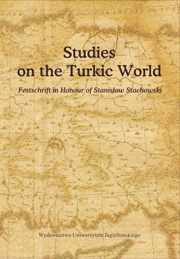Book contents
- Frontmatter
- Tabula Gratulatoria
- Contents
- Prezento de la scienca agado de prof. d-ro habil. Stanislao Stachowski
- Publications of Prof. Stanisław Stachowski
- Articles
- Bulgars and Slavs: Phonetic Features in Early Loanwords
- The Consonants ž ˜ ǧ in Kazakh
- Überlegungen zum Problem von Sprachtabus im Alttürkischen
- On the Expression of (ä)dgü kört(ä)či s(ä)n on the Bilgä Kagan Inscription
- On the Iranian Honorific Title bag, baγ, bay ‘lord, prince’
- Proto-Turkic Causative in *-g-?
- Relations entre les titres turcs qaγan, qan, qaγatun, qatun
- North-Western and Eastern Karaim Features in a Manuscript Found in Łuck
- The Importance of Bernardino Pianzola's Work for Turkish Lexicography
- Osmanische Einflüsse auf das Krim-Areal
- Turkish Proverbs in A Grammar of the Turkish Language by Thomas Vaughan (1709)
- Türk Dillerinde çilek ve yilek
- On First Syllable Reduplications in Karaim
- Names of Animals in Armeno-Kipchak: A New List Brought to Light
- Zum historisch-kulturellen Hintergrund der jenissejisch-türkischen Wortparallelen
- A New Fragment of the Mañjuśrīnāmasaṃgīti in Old Uyghur
- Ḳıṣaṣ-ı Enbiyā'dan. Eski Anadolu Türkçesinin Sözvarlığına Katkılar II
- Gezi Edebiyatının Öneminde Ahmet İhsan ve Şerafeddin Mağmumi'nin Yeri
- Das türkische Vaterunser in syrischer Schrift
- Invitation to Discussion
Turkish Proverbs in A Grammar of the Turkish Language by Thomas Vaughan (1709)
from Articles
Published online by Cambridge University Press: 05 September 2014
- Frontmatter
- Tabula Gratulatoria
- Contents
- Prezento de la scienca agado de prof. d-ro habil. Stanislao Stachowski
- Publications of Prof. Stanisław Stachowski
- Articles
- Bulgars and Slavs: Phonetic Features in Early Loanwords
- The Consonants ž ˜ ǧ in Kazakh
- Überlegungen zum Problem von Sprachtabus im Alttürkischen
- On the Expression of (ä)dgü kört(ä)či s(ä)n on the Bilgä Kagan Inscription
- On the Iranian Honorific Title bag, baγ, bay ‘lord, prince’
- Proto-Turkic Causative in *-g-?
- Relations entre les titres turcs qaγan, qan, qaγatun, qatun
- North-Western and Eastern Karaim Features in a Manuscript Found in Łuck
- The Importance of Bernardino Pianzola's Work for Turkish Lexicography
- Osmanische Einflüsse auf das Krim-Areal
- Turkish Proverbs in A Grammar of the Turkish Language by Thomas Vaughan (1709)
- Türk Dillerinde çilek ve yilek
- On First Syllable Reduplications in Karaim
- Names of Animals in Armeno-Kipchak: A New List Brought to Light
- Zum historisch-kulturellen Hintergrund der jenissejisch-türkischen Wortparallelen
- A New Fragment of the Mañjuśrīnāmasaṃgīti in Old Uyghur
- Ḳıṣaṣ-ı Enbiyā'dan. Eski Anadolu Türkçesinin Sözvarlığına Katkılar II
- Gezi Edebiyatının Öneminde Ahmet İhsan ve Şerafeddin Mağmumi'nin Yeri
- Das türkische Vaterunser in syrischer Schrift
- Invitation to Discussion
Summary
As Erika Hitzigrath Gilson writes:
… There are (…) sources for Ottoman-Turkish without which the study of historical Turkish linguistics – phonology and dialectology in particular – will be quite restricted. These are recordings of the Turkish language by foreigners, represented in their own respective writing system as they perceived and interpreted the acoustical shape of the utterances. Such “Transkriptiostexte” supply invaluable data for Ottoman-Turkish of the fifteenth to the nineteenth centuries (Gilson 1987: 1).
One of the such “Transkripionstexte” is A Grammar of the Turkish Language written by an Englishman – Thomas Vaughan – and published in London 1709.
A few words about the author and the content of its work follow.
The author mentions his profession on the front page of his Grammar where we can read “Thomas Vaughan, Late of Smyrna, Merchant”. From the second page we find out that the book was dedicated to George Boddington Esq. of whom Thomas Vaughan was a nephew. Gilson writes in her book that very little is known about Vaughan's life, but she adds that he was associated with the Levant Company and it is quite probable that he could have stayed in Turkish-speaking territory for 12 years from 1697 to 1709. She also pays attention to comments included in the Preface to his Grammar which allows us to deduce that he was well-educated, knew several foreign languages, and the field of his various interests was very broad (Gilson 1987: 3).
- Type
- Chapter
- Information
- Studies on the Turkic WorldA Festschrift in Honor of Stanisław Stachowski, pp. 121 - 130Publisher: Jagiellonian University PressPrint publication year: 2010

